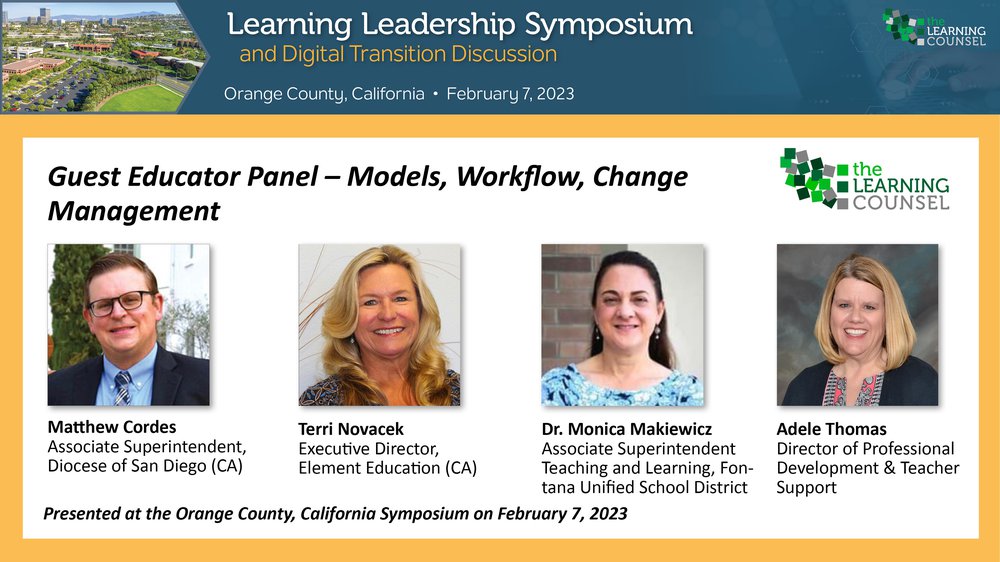One thing you can often accuse the Learning Counsel of is saving the best for last. At this year’s Orange County Learning Leadership Symposium, the answer to that accusation would be, ‘Guilty as Charged.’ That is because this year’s team of area national experts was second to none, and delivered a bevy of intelligent, useful solutions to help districts nationwide with their own digital transitions.
This year’s panelists include Matthew Cordes, Associate Superintendent at the Diocese of San Diego, Terri Novacek, Executive Director at Element Education, Dr. Monica Makiewicz, Associate Superintendent of Teaching and Learning at Fontana Unified School District, and Adele Thomas, Director of Professional Development and Teacher Support at Fontana Unified School District.
According to panel host LeiLani Cauthen, CEO of the Learning Counsel, “We had a bit of a theme today about Leading the Learning Matrix, so part of that is boiling it all down to get organized, like what's going to work, what isn't going to work. But I think it's beyond that. It's get organized with a caveat, which is to do so at an Institutional level. The digital world is different, and you need to lead that as a matrix in an orchestrated way.”
“In Fontana Unified, we have 46 different School sites,” said Thomas. “I think if we do not have some type of structure… well, there's something that takes me back to the fact that you can have good schools and not have a District, but you can't have good schools if you don't have a good District. I think you need to have the structures and common goals defining what you're trying to accomplish and why you exist, but then the avenue of how each individual school gets there, that's where you have that tight/loose, you have to have both. If we look at some of our traditional pacing guides, that didn't get us to where we needed to be but if you leave it up to each individual teacher, that is also problematic, so I think it's having the schools operate on the goals that you've set as a district or your structure that may be the way to get there is different. That's where we look at the flexibility of time and teaching and it doesn't always have to happen inside the building. Getting outside of that traditional master schedule, it has to be the teacher delivering it and looking at some of these flexibilities.”
One of the changing tides that we're seeing is we should have always been focused on students, but at this current moment in our field we have to be focused on the teachers,” said Cordes. “We're running out of them, we don't have enough of them and the ones that are great are dying off by the minute because they are putting in 10 times the work when they shouldn't have to because we're not empowering them with enough tools and not giving them the training to be able to let them feel okay letting go of certain things that they've held on to.”
“From an organizational level,” said Cordes, “We have to start with how do we make the lives of the people who serve the people the best and so when we start to look at those things it should be about creating efficiencies that makes people's lives easier? Our teachers got to stay home for three months. A lot of other teachers in other school districts got to stay home for a lot longer than three months; ours only got to stay home for three months and we're very proud of that, but during those three months they got used to saying, “Hey look on my lunch break I can run to Target real quick or if I need to, our day only goes to one o'clock online and that means I can schedule an appointment at 1:30. When you talk about what's the future going to look like, it's about how do we start incorporating systems technologies choice in place not only for our students but for our staff so that way they're happier and they stay longer and they want to be a part of what we're doing.”
As a last question, Cauthen asked, “What does the future look like?”
“I'm going to make a bold statement here,” said Novacek, “and I'm going to preface it by revealing my background as a single subject content area specialist. I believe content area specialists are becoming dinosaurs because that content is accessible, and you don't have to rely on me to know how to write a five-paragraph essay to understand the plot of a novel. I think that personal responsibility and accountability is the primary need right now DC and Ryan did the self-determined theory back in the 70s and in all these decades those people excelled and I don't think that that's just something for a small group of high Achievers. I think that's something everybody is going to need to succeed and so I see education in this transition right now, and I would argue laying out what a student needs to learn because I do believe that pathway needs to look different for every one of them, but we have to stop controlling education and spoon feeding our students and then let them graduate and say bye-bye, go make all your own decisions, now be self-determined.”
As per usual, our panelists pulled no punches, and everyone spoke from the heart. This is a video of mastery and passion, and it is a great mix to find solutions to problems in their districts – and yours.











